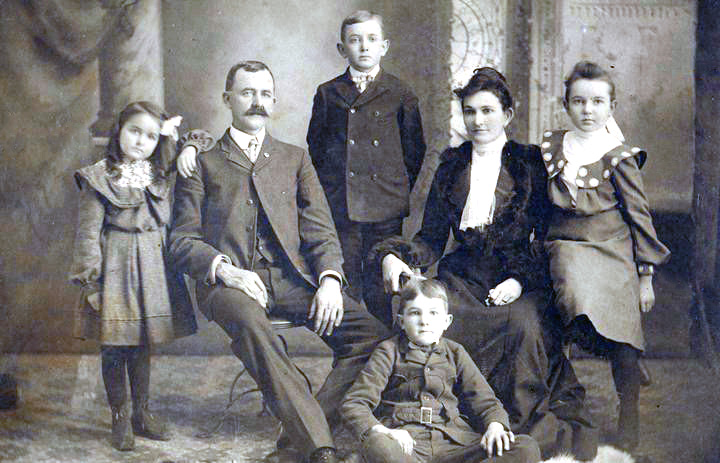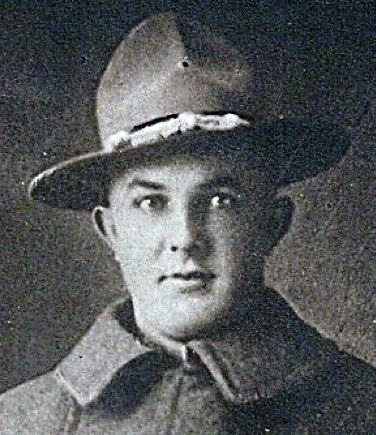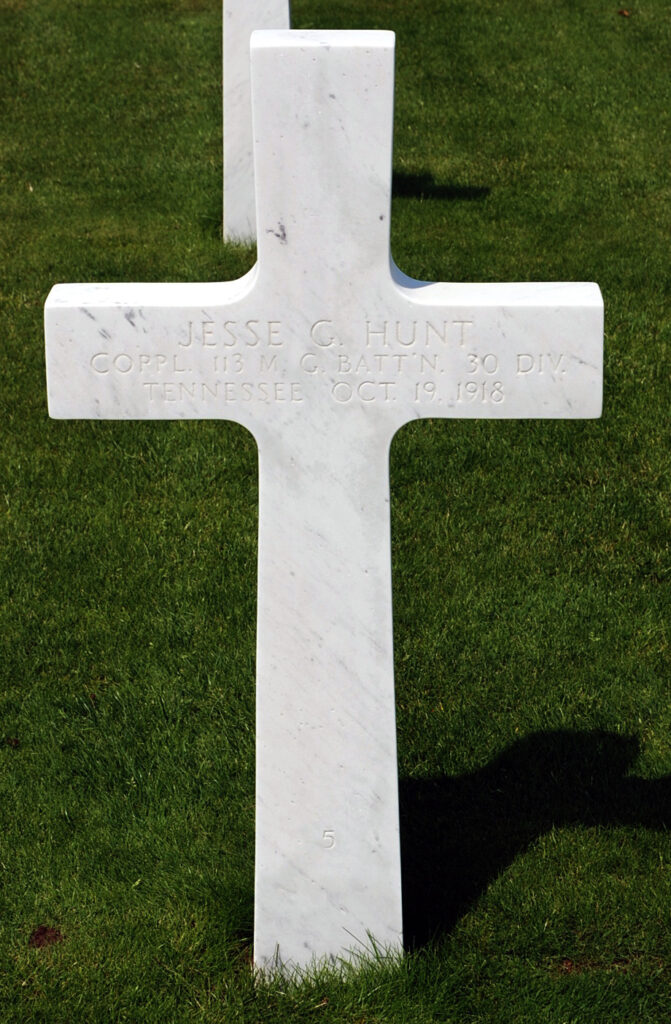
Corporal Jesse G. Hunt was born May 1895 to Willis Nathaniel Hunt and Annie Blond Strange in the Gift area of Tipton County, Tenn., the third of their four children.
Jesse lost his mother at the tender age of 10, when his mother Annie died on Jun 30, 1906 after an illness of five weeks, leaving his father to raise his siblings, Billy, Maude and Sarah and himself, alone. On Dec. 13, 1910, his father, Willis, remarried for a second time to Georgia Barton.
Ten years later at the age of 21, Jesse enlisted in the Tennessee National Guard as a private on June 25, 1916 with Co. I, 1st Tennessee Regiment Inf., Battery E, 115th Field Artillery (FA), trained at Camp Sevier, Greenville, S.C., and served on the Mexican border in the hopes of catching General Pancho Villa.
Life on the Border

Cpl. Hunt was quite the prolific writer and often throughout his military career wrote letters home to his father of what his life was like, who then shared the letters with The Covington Leader and thus, the community.
One such letter was written expressing what he conveys as the sentiments of the “Memphis Boys” and the requirements that they stay on the border between Mexico and the United States. and sent to a staff member of The Covington Leader, dated Eagle Pass, Tex., Jan. 22, 1917, and reads in part,
“Guess Covington saw the most prosperous year in her history last year. Was sure glad that the people enjoyed such good prices for their crops. We have sure seen some hard times while here, but guess the experience will do most of us good. I know it will do me good. I get your paper every week. It is a lot of comfort and pleasure to Bob, Edwin and myself. We all sit up Saturday night and wait for it.
“I cut a piece out of the Commercial Appeal that explains just how we all feel about the way we have been treated in the army. Am sending it to your paper.
“This is the most un-Godly place in the world, I believe. I could write all night about the experience we’ve had, but guess I can tell you better than I could write it. So I guess it will be better for me to wait. We are expecting to be there by the 15th of February.”
Boys Want to Come Home
To The Commercial Appeal:
Why are the members of the National Guard kept on the border in time of peace, not only the Memphis boys, but all that are serving Uncle Sam?
Why are we changed from Eagle Pass to a ranch 60 miles from a railroad station or civilization?
Why should we protect one man’s ranch and let others go unprotected?
Why can’t we come home?
Now, we feel this way, not because we are. homesick, but it is merely to let the people, who have sons in the army and on the border, know just their circumstances, and how many good fellows are losing, their jobs, homes and sweethearts by this call, which has amounted to practically nothing.
Why did Gen. Pershing go into Mexico and now coming out without capturing Villa, the Mexican bandit, troops and let others remain? Think it over. We have been called out since the 19th of June, 1916, and have been on the border since the 19th of September. While the New York boys and others left after 30 days of border service.
Yet we poor fellows have to stay there until they get ready for us to go. If the officers would tell the men how long they had to stay and not keep publishing pieces in the papers about them expected home, such as “Tennessee troops expected home Jan. 15-17, not later than Feb. 1, 1917”, the boys would be more satisfied to stay.
Now, kind readers, think of the hardships we have to stand, and how hot it gets down here in the summer and if there is a chance for us to come back to the civilized world, you will be thankful a thousand times for your part done in getting us away from this part of the world and bringing us back to our loved ones. – SOME OF THE MEMPHIS BOYS at Eagle’s Pass, Texas (The Covington Leader, 1 Feb. 1917)
A couple of other letters published in The Covington Leader talked of the “boys from Tipton County” and how they were ready to participate in the European war.
FROM COVINGTON GUARDSMAN
A member of the Leader staff recently received a very interesting communication from Mr. Jesse G. Hunt, with Company I, First Tennessee regiment, now at Camp Andrew Jackson, near Nashville. His letter reads, in part, as follows:
“All the boys from Covington are getting along fine. We are to leave here soon for Columbia to guard the phosphate mines and railroads. The while regiment is going to be divided up and sent all over the state. We received orders last night to recruit all companies up to war strength. The Nashville Tennesseean published a piece yesterday that the First Tennessee regiment would be sent to France with the first troops to go. When we were first called out we all took things as a joke, but now they are looking on it as a serious matter. However, everybody in the regiment is ready to go now. (The Covington Leader, 17 May 1917)
LETTER FROM TIPTONIAN AT GREENVILLE, S. C.
A member of the Leader staff has received a letter from Sergeant Jesse G. Hunt, of Company “I” First Tennessee regiment of infantry, dated Greenville, S. C., September 11, from which we copy the following:
We’ve at last moved from Nashville, but very much to our sorrow. We are five miles from Greenville and in the middle of a forest. These boys will make a good crowd to clear a “new ground” instead of soldiers. I never saw a place as thick with timber and underbrush as our camp is. There are between 30,000 and 40,000 men here from North Carolina, South Carolina, and Tennessee. Each state has three regiments of infantry, besides the artillery, cavalry, engineer and hospital corps.
Bell Meade is a palace compared with Camp Sevier. Every man in our regiment says he rather be in the trenches in France than here. I believe they mean every word of it, too.
We left Nashville Saturday afternoon in the rain. All our baggage was locked up, so we were on the road 28 hours with a change of dry clothes. We came through Chattanooga and Atlanta. When we got here it started to raining again. Had to unload all the trains in the rain. Monday morning we started to clearing a thicket for our camp. We’ll have to soldier for a while with the saw, pick and axe instead of the gun. This trip has been a good sample of the army for the new “rookies.”
Greenville is a pretty town, 43,000 population, including 18 cotton mills. Guess they would have a population of about 18,000 if it wasn’t for all the mill hands. Some of the mills are 10 miles away from town.
Hoping Tipton county’s people a prosperous and happy winter. Let us hear from you soon. All the Tipton county boys spend their best regards to you and all. Bob Burnett is still in the hospital, but seems to be improving. (The Covington Leader, 20 Sep 1917)
The Great War
Private Hunt at the time, soon got his wish to leave the border and immediately transferred to the regular U.S. Army / American Expeditionary Forces after the U.S. entered the Great War. Pvt. Hunt, U.S. Army serial #1327413, set sail for Europe out of Philadelphia, Penn., on the S.S. Haverford on May 11, 1918, with Co. A, 105th Military Police and arrived in Europe later that same month. He was then joined with Company A, 113th Regiment, 30th Division, where he saw action at the Battles of Ypres, St. Quintin, St. Martin and at Maidenheim, France.
Another letter from Jesse to his father written August 1918, spoke of his understanding of their roles and how he and his fellow soldiers from Tipton County were trying to make the “best of it.”
August 16, 1918 – My Dear Papa – Just a few lines to let you know I’m getting along fine. Don’t think I’ll get to write again soon, as my turn comes to take my part of the task. I feel just as lucky and as good as the day I volunteered my service to the best country in the world. Will H. [Hopper] is sitting on one side of a shock of wheat and I am on the other. Haven’t we got a good place to write? But it beats some places where I have written since my arrival over here. But we take our hardships as more of a joke now than anything else – laugh and talk about what we go through with instead of getting mad and fussing.
We were billed in old barns when we first came over that were so full of lice you couldn’t be comfortable in any position you’d get in. I’ve been full of them several times. Yesterday we got a clean exchange of clothing and a bath, so I’m rid of them today.
France is much better country than Belgium in my estimation. I have been to Ypres, Soissons and several other places of prominence, and expected to see many more before I go back to the U.S. I am learning machine guns fast, and like it better each day. Old Fritz hasn’t much chance when you turn one loose at him, and I have had the muchly desired pleasured. I hope to be called again real soon. All the boys in the company from there are o.k. and send their kindest regards to you and all. John W. asks about Uncle Willis real often. He thinks a lot of you. Got a letter from Jesse Rose a few days ago. All the boys in the artillery are getting along fine. We are getting plenty of work at present.
I’ve never forgotten the Leader, but look for it in every mail. Money is awfully scare over here. The only way we can get it is by money order. How are your crop prospects for this time of year? Hope you make a clean-up on everything. – Jesse H. Hunt (The Covington Leader, 19 Sept. 1918)
Another letter, most likely the last written to his father before he was killed in action a couple of weeks after it was written, told of his unit’s heroic battle going “Over the Top.” It was published in The Covington Leader before his father knew of his death.
TIPTON COUNTY BOYS GO OVER THE TOP
France, October 4, 1918
I know you have read the papers and have seen what we did in our last battle. I went into the front line trench September 28. Went over the top Sunday, September 29. Spent all that day in No Man’s Land. Came out to the reserve trenches that night and was called back to the front again Monday morning for reinforcements. Would like to tell you just what happened, but can’t. I was made corporal the day before the fight. We had 17 casualties in the company. My squad was the only lucky one, as we didn’t have a one. Will Hopper is in my squad. None of the boys from Tipton County were hurt. All the casualties were from Memphis.
Papa, you can’t imagine one’s thoughts just before he goes over the top and while he is in No Man’s Land, under a barrage of artillery of all kinds, rifle, machine gun fire, and all kins of gases. All those things come at one time.
Our objective was the Hindenburg line. Had to cross the St. Quentin canal, which is west of St. Quentin. Believe me, we took what we went after, then some. I know you have read of the Hindenburg line and how strong it is. There is no more Hindenburg Line.
I didn’t get any souvenirs, for I was too weak to carry any more than I had to. I think I’d make the best one anyway if I can get out alive.
Jesse G. Hunt
I slept – or tried to sleep – for two nights in a dugout in the line. There were 14 dead Germans in the dugout with Will Hopper and myself. You can’t imagine how hard it is too pass your friends that are wounded, or to see them lying dead all around. The only consolation we have is to leave more dead Germans than we do our comrades. The fight started at Bellicourt, near St. Quentin. The Prussian Guards, or the Kaiser’s best troops, were against us; but you can rest assured that they were whipped good in every way they tried to fight. My gun was the first one from the company into action. We advanced with the infantry. I didn’t get any souvenirs, for I was too weak to carry any more than I had to. I think I’d make the best one anyway if I can get out alive. The Lord was certainly with me or I would never have lived to write this. Will Hopper was right by my side all through it, which I was mighty glad of. He can tell the people when the war is over what I did. Believe me, he is a brave boy too. I saw Robert Gift the day after the battle. He is O.K. Ran upon him in the trenches. His company did not have to go over the top. It was a mistake about John Chapman getting killed.
I’m getting along fine now. Was pretty weak and nervous for a few days. When you hear a person say they are not afraid of anything, you can tell them it’s a lie. They just don’t know.
Your son, Jesse G. Hunt (The Covington Leader, 7 Nov. 1918)
Death of a Hero
SERGEANT JESSE G. HUNT HIT NINETEEN TIMES
Mr. W. N. Hunt, who lives near Covington, has received a telegram from the United States war department notifying him of the death of his son, Sergt. Jesse G. Hunt, in France. Neither the date nor the cause of his death is given. Sergt. Hunt was a member of Co. C, 113th Machine Gun Battalion, 30th division and it is known that on October 19, 1918, in some village in France, he was perhaps mortally wounded by a German Shrapnel shell, as 19 splinters took effect in his limbs and arms. The village was captured by the allied troops after desperate street fighting. After he was wounded, Sergt. Hunt was hurried to the field hospital and up to the present time his relatives have been unable to ascertain any details as to when or where he died. It was assumed that he died as the result of his wounds, however, as it was his custom to write frequently to his father and since October 19, 1918, his father has been unable to learn of his fate until the receipt of the telegram from the war department, although every effort has been made to do so.
Memorial services in memory of Sergt. Hunt will be held in Covington in the First Presbyterian Church , of which he was a member, on Sunday afternoon, May 4, at 3:30 o’clock, Dr. R. P. Walker, pastor of the church, to conduct the services. An address will be delivered by Col. William Sanford, a gallant Confederate veteran and one of the Tennessee’s most gifted and eloquent orators. Mr. Will Hopper, his comrade in arms on the western front, will tell of their experiences together in the trenches.
Jesse Hunt was 23 years of age and was unmarried. He was a noble and gallant soldier and enlisted in the Chickasaw Guards of Memphis, and served on the Mexican border. He immediately enlisted when war was declared against Germany and arrived in France in May 1918. He participated in a number of battles before he was mortally wounded, and displayed rare courage and fearlessness and a determination to do his full duty under any and all circumstances. His death was a great shock to his relatives and many friends in Tipton County. (The Covington Leader, 1 May 1919)
One last article printed in the May 8, 1919 edition of The Covington Leader after the memorial service for Cpl. Hunt, spoke of the heartache felt at the loss of such a promising young man.
SPLENDID TRIBUTE TO SERGEANT JESSE HUNT
Memorial services in memory of Sergt. Jesse G. Hunt, of Co. C, 113th Machine Gun Battalion, 30th Division, American Expeditionary Forces (A. E. F.), were held in the First Presbyterian Church, of which Sergt. Hunt was a member, at 3:30 o’clock Sunday afternoon, Dr. R. P. Walker, pastor of the church. conducted the services. The church was crowed with the relatives and friends of this gallant young soldier who made the supreme sacrifice for his country, being killed in action in Maidenheim, France, October 18, 1918.
Col. William Sanford, a gallant Confederate veteran, delivered a most eloquent address, and William Hopper, of this city, who served with Sergt. Hunt, gave a graphic description of the battle in which he was killed.
Sergt. Hunt was wounded in 15 different parts of the body by a shrapnel shell. He was 23 years of age and was a son of ex-Register W. N. Hunt, of this city. He served on the Mexican border and immediately enlisted when war was declared against Germany and landed in France in May 1918. His comrades stated that he was fearless and faithful to the end. For months his father, although he made every effort to do so, could not ascertain his fate, and only recently the United States war department notified him that he had been killed in action.
Although, all of The Covington Leader articles referred to Cpl. Jesse G. Hunt as “Sergeant,” that was in error, as military records list his rank as Corporal when he died.
Corporal Jesse G. Hunt was never brought back home to Tipton County, Tenn., but was laid to rest in Bony, Aisne, France. His final resting place is Plot B, Row 18, Grave 5 in the Somme American Cemetery, located in the Picardie countryside and home to 1,844 young American soldiers who gave their lives on foreign shores, never to see their homeland again.
When you hear a person say they are not afraid of anything, you can tell them it’s a lie. They just don’t know.
Jesse G. Hunt


